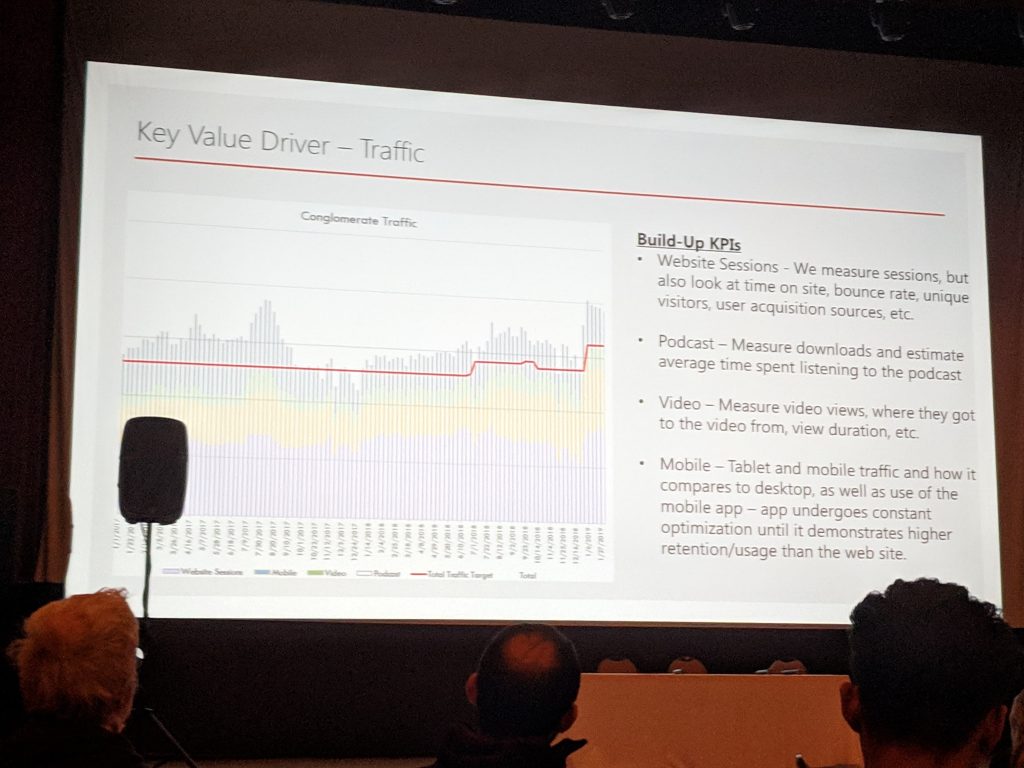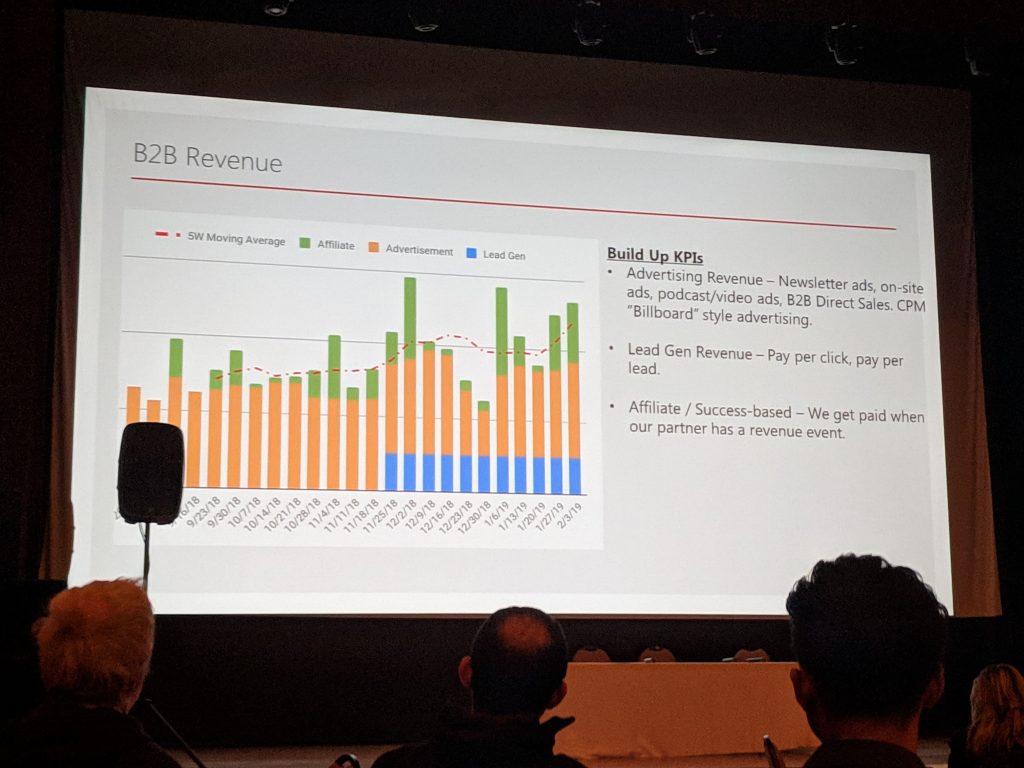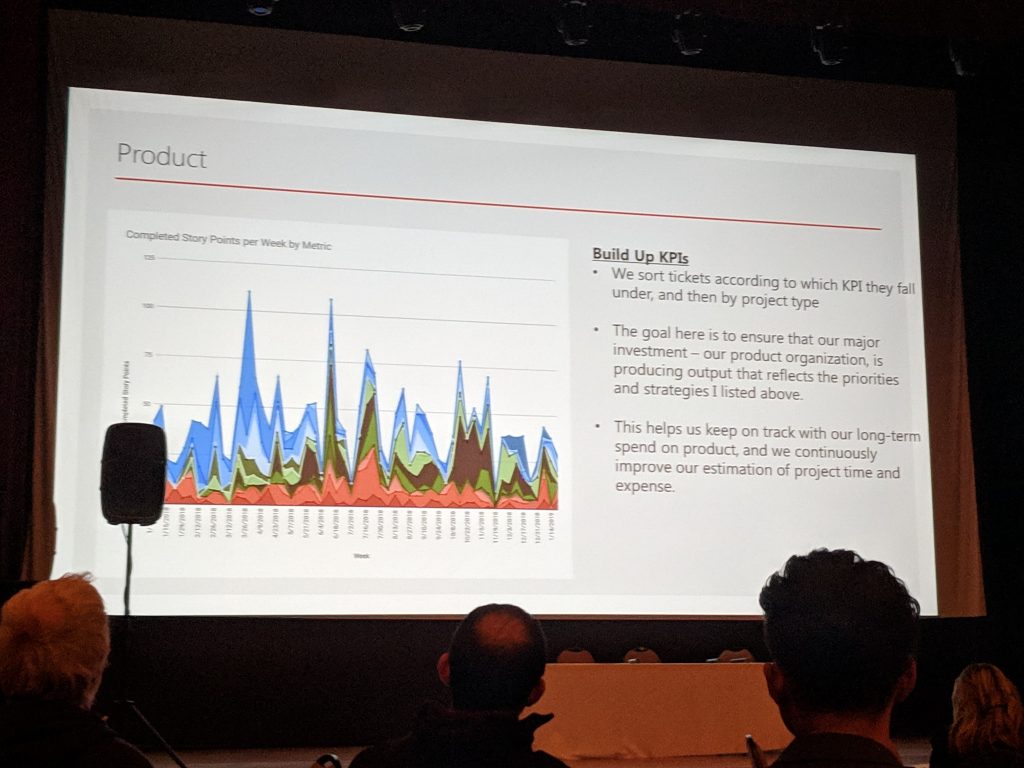While at the SF Bay Summit 2019, we received a special presentation from 27-year old Scott Trench, CEO of BiggerPockets. Back in 2014 I used to use BiggerPockets to immerse myself in the real estate investing world, and it’s now become a leading platform for people to network with each other in RE.
It was awesome that Scott came to tell us more about his strategic business plan with the company. He had just taken the CEO role quite recently, and he’s very young, even younger than me! I was extremely impressed by the way he was managing the company, and I was shocked that he was revealing so much information to the group. Out of all the different seminars, this was one of my favorites (though it is was not as real estate related). It probably interested me more because I have a business/marketing/entrepreneurial background, and I really appreciated that Scott was willing to share his strategic business plan.
Scott Trench and I!
Below are the notes I took with my friend. I learned so much about their business and how they manage processes within the business. Hopefully the notes are as helpful to you as they were for me, and hope it gives good advice on how to write a business plan.
Disclaimer: While all attempts are made to present correct information, there is a chance I’ve written notes incorrectly!
Scott Trench, CEO of BiggerPockets, Reveals his Strategic Business Plan for the Company (How to Write a Business Plan)
How we’re growing the BiggerPockets company
What makes a good mission?
- Aligns with the personal passion of the leader of the company
- Speaks to a non-financial goal – a goal to making lives better for other people or otherwise positively impacting the world.
- Is something that will motivate you in good times and in bad
- Can be communicated clearly to anyone in a short time span
- Is intuitive
Make sure your personal mission aligns with the company mission
BiggerPockets mission: We help ordinary Americans build wealth at scale through privately owned real estate investments. Specifically, we support the creation of $1M in wealth through real estate for 1 million users
Their competitive advantage (is you)
- 1.2 M members posting high quality UGC. Continuously growing through a positive feedback loop
- Cycle of Traffic → Community → Content & Tools (which leads to more traffic)
Our users – who they are, and what they want
- 80% of users earn between $50k-200k per year
- 75% are male
- 45% of users own at least 1 investment property not including their home. 49 % do not currently invest. A small leftover percentage are on BiggerPockets as a vendor or real estate service professional
- There are few, if any, other unifying characteristics of our users from a demographic standpoint. There are no meaningful deviations from the normal US population in areas like geography, age, ethnicity, family status, etc.
- No demographic info that ties everyone together. Perhaps a better way to picture our users is in what they want
- Nearly all users (90%) are interested in rental property investing and the resulting passive income
- Being able to quit your job is somewhat important for 80% of our users
- Many of these users are interested in flipping/wholesaling/notes etc. but they are often interested in those strategies as a means to an end of owning rental properties
- Many of our users have read material on other financial sites and resources – e.g. Rich Dad Poor Dad, The 4-Hour Workweek etc.
- Our users typically aspire to build wealth in several ways. They may have stocks, cash, small businesses, strong careers, or all of the above in addition to real estate pursuits
Biggest struggles of users:
- Finding deals
- Solution 1: Connect users with agents
- Give investors/clients 4 data points on agents –
- # of posts by agent,
- # of votes by agent,
- # of deals by agent with BP investors,
- # of references from BP investors
- Give agents data points on prospects:
- Is the user serious or dabbling? – timeline
- Make a large directory for all types of people
- Is the user serious or dabbling? – timeline
- Connect users with deals
- Deliver deals to them directly in an investment marketplace.
- Give investors/clients 4 data points on agents –
- Financing deals
- Getting started
As the CEO, his operating philosophy is: Each individual is held accountable for one KPI
Individuals must be prepared with 4 things at all times
- Accurate data describing performance of their metric
- Clear communication of why their metric is increasing decreasing or staying the same
- Clear understanding of lead measures of success and actions taken against them
- An operating plan that will drive their metric forward over the short medium long term
In spite of heavy focus on individual performance, I incentivize through bonuses for the entire company for team performance. If someone isn’t cutting it, they are preventing everyone from the CEO to an assistant, from getting paid
Pros:
- This limits the blame game as you need to make your case and perform.
- People become more receptive to ideas and feedback. It only looks good when numbers move, not when people have all the ideas.
- It also allows him to move team members who aren’t working out
Cons:
- Communication becomes an issue. Marketing is not approving all copy and design so some things go out that are inconsistent with the brand – needs a process to resolve this.
- Competition over engineering and budget resources – folks on some key metrics need to make a business case for spend to improve their KPI at the expense of other initiatives.
- Folks need to operate outside their traditional skillsets – I expect publishing to be excellent at logistics, sales, editing, strategy, marketing, etc. and to rapidly address those areas of weakness.
Below includes information on their KPIs:



Weekly Meetings:
- I prefer weekly meetings that last 15-30 minutes
- During this weekly meeting, one of four groups will present on progress:
- Week 1: Content
- Week 2: Conversion
- Week 3: B2B Revenue
- Week 4: Publishing, HR, Product, and Support
- I expect a visual representation of each KPI.
- We have never gotten this perfect – I am 100% skeptical of very reporting dashboard in existence. Constant, weekly updating is the only way to stay on top of KPIs in my opinion.
- It is absolutely critical to keeping people on task and constantly coming back to their metric.
Compensation philosophy:
- We pay base salary at the 50th percentile for the Denver market
- We have competitive health, retirement, etc. benefits
- We have a performance-based bonus plan tailored to individual performance (annual)
- We have a performance-based bonus plan tailored to team financial performance (quarterly)
- Gives $3k bonus per quarter. $1500 immediately per quarter $1500 at end of year per team. Makes them stay to end of year
- Food and extra PTO are good motivators, sometimes better than financial incentives
Management Philosophy
- Individuals must understand why the work we are doing is GOOD for the world
- Individuals must understand exactly how their work drives business values and feel important
- Individuals must feel that their opportunities for career advancement are faster at BiggerPockets than at similar competing technology organizations
- Individuals must enjoy the work environment and the people in the office
Books to read
- Winning by Jack Welch
- The 4 Disciplines of Execution by Chris McChesney
- Measure What Matters by John Doerr
- The Millionaire Next Door by Thomas J. Stanley
To be a great blogger:
- What is the purpose of you writing? It’s to be read
- Work on your title so that it’s attention grabbing.
- You need to have an opinion on something different. If you write what everyone is thinking already, no one will read your stuff
- Be consistent on your content. It will take a few years.
- Don’t say what everyone says
Conclusion
I was astounded by all the details Scott provided in his seminar! Managing a team is a whole n’other beast. I’ve managed employees before (and still currently do), but it’s different when you’re leading an entire company. You want to make sure there are measurable KPIs and systems in place that allow your team members to work effectively. It can be difficult figuring out how to make sure everyone is doing their part and trying to work towards the company’s best interests. I am definitely going to go back to these notes in the future, in case I ever wanted to run my own company with many employees.
Let me know what you think of Scott Trench’s notes in the comments below!



